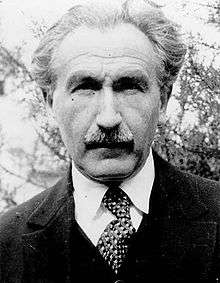Hugo Bergmann
Hugo Bergmann (Hebrew: שמואל הוגו ברגמן; December 25, 1883 – June 18, 1975) was an Israeli philosopher.
Hugo Bergmann | |
|---|---|
 Bergmann, 1939 | |
| Born | Samuel Hugo Bergmann December 25, 1883 |
| Died | June 18, 1975 (aged 91) |
| Occupation | Philosopher |
| Children | Martin S. Bergmann |
| Relatives | Michael Bergmann (grandson) |
Biography
Hugo Samuel Bergmann was born and raised in Austria-Hungary. He was a member of the Prague intelligentsia visiting the salon group that met at the house of Berta Fanta. Bergmann married her daughter Else Fanta.[1]
Bergmann and his wife immigrated to Palestine in 1920.[2]They lived in the Rehavia neighborhood of Jerusalem.[3]
Together with Martin Buber, he founded Brit Shalom, an organization espousing a binational solution for promoting the co-existence of Jews and Arabs in the State of Israel.
Bergmann is the father of Martin S. Bergmann, professor of psychology at New York University, and the uncle of the Czech philosopher and historian Pavel Bergmann.
Academic career

He became a Professor at the Hebrew University of Jerusalem, and later on the dean of the university. He was friends with Franz Kafka, who was a schoolmate of his, the philosopher Felix Weltsch, who later worked at the Hebrew University Library in Jerusalem, and Max Brod, who he introduced to Zionism before 1910.
He wrote on the nature of quantum mechanics and causality where he interpreted spontaneity in nature with the psychological idea that the closer we come to elements in nature or components in the individual, the less tenable is strict causal determinism and the more freedom we must grant to decisive personal elements: "In corresponding areas of physics, the statistical law of averages takes on the same functions in determining temporal position and in prediction and reconstruction that the strict law of causality previously covered, but with the distinction that the individual case could be temporally located and predicted or reconstructed before, whereas now we deal only with the average." (1929)
He translated several of Rudolf Steiner's books about Threefold Social Order into Hebrew.
Awards and recognition
- Bergmann was twice a recipient of the Israel Prize:
- in 1954, for the humanities[4]
- in 1974 for his special contribution to society and the State of Israel.[5]
- He was a recipient of the Yakir Yerushalayim (Worthy Citizen of Jerusalem) award in 1967, the year of the award's inauguration.[6]
- He is also a recipient of the Tchernichovsky Prize for exemplary translation.
Further reading
- Hugo Bergmann: Das philosophische Werk Bernard Bolzanos, Halle s. S.: Max Niemeyer, 1909 (reprint: Hildesheim: Georg Olms, 1970).
- Miriam Sambursky: Zionist und Philosoph. Das Habilitierungsproblem des jungen Hugo Bergmann. Bulletin des Leo Baeck Instituts 58
- Miriam Sambursky (Hrsg.): Schmuel Hugo Bergmann: Tagebücher und Briefe. Band 1: 1901-1948.
- Dietmar Wiechmann: Der Traum vom Frieden: das bi-nationale Konzept des Brith-Schalom zur Lösung des jüdisch-arabischen Konfliktes in der Zeit von 1925-1933, 1998, ISBN 3-87920-416-0
References
- "YIVO | Fanta, Berta". Yivoencyclopedia.org. Retrieved 2014-02-02.
- Spector, Scott. "Bergmann, Hugo." YIVO Encyclopedia of Jews in Eastern Europe 27 July 2010. 2 February 2014 link
- Ghosts of Rehavia's Zeitgeist, Haaretz
- "Israel Prize recipients in 1954 (in Hebrew)". Israel Prize Official Site. Archived from the original on February 11, 2010.
- "Israel Prize recipients in 1974 (in Hebrew)". Israel Prize Official Site. Archived from the original on February 18, 2010.
- "Recipients of Yakir Yerushalayim award (in Hebrew)". Archived from the original on 2011-06-17. City of Jerusalem official web site
External links
| Wikimedia Commons has media related to Hugo Bergmann. |